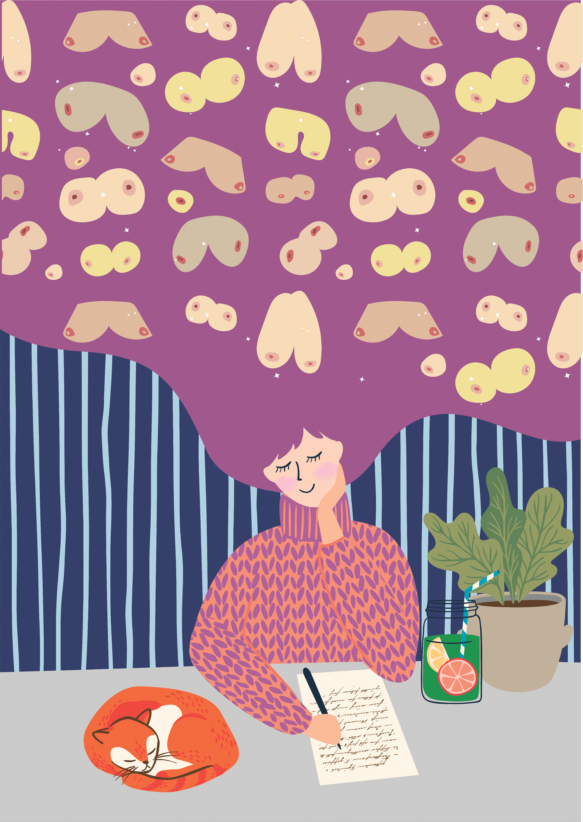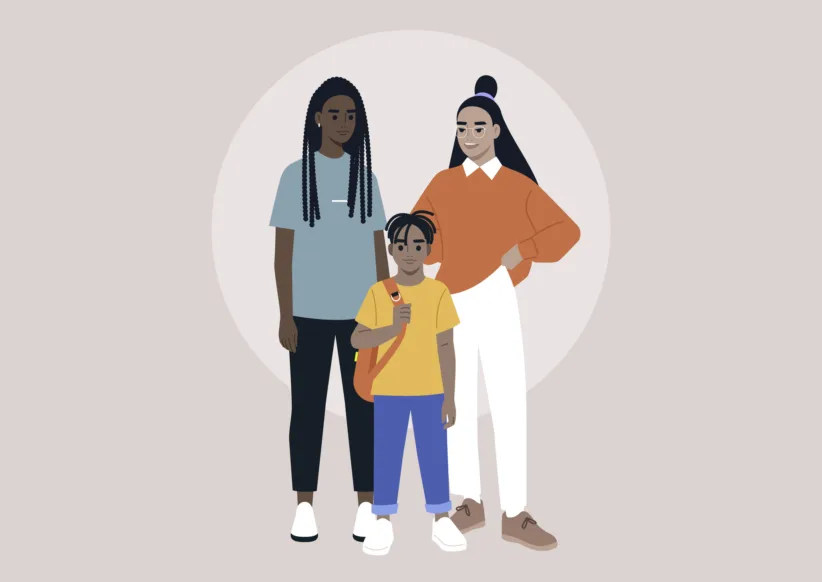
Moms don’t wear makeup in this part of Brooklyn. Our wrinkles are hard-won — badges of honor, from worrying about preschool acceptance, or milestones, or whether our kids need speech therapy or OT, or PT, (or all the T’s.) Mascara at drop-off means we must be going somewhere fancy, or . . . to an office. “Botox” is something we allow our cohorts on The Upper East Side to do, and maybe a sprinkle of folks in Park Slope. If we get Botox for a medical reason, like chronic migraine, we get a pass. But we make sure we let everyone know THE REASON. I am something of an anomaly among the moms around here. I am a mom who not only disobeyed the local treatise to avoid Botox, I took the nuclear option as well — and got breast implants. I hope after writing this article, they still let me live here because our zoned school is really top-notch.
No one would really know, looking at them. They’re good. Like, really good. And they better be, because my family and I suffered greatly for them. Was it worth it? Well, let me tell you all about it. There’s a history.
After nursing each of my two kids for about 18 months each, my breasts looked like the balloons you find under the couch, days after the party — used for pleasure and then discarded and forgotten. And I was not thrilled that any time I bent over, they assumed the shape of jiggly Hershey’s Kisses. But it wasn’t anything I wouldn’t have been able to live with.
I also wasn’t really sweating the decision like it was anything major. Many women in my family had gotten plastic surgery. They had lived to tell the tale. It seemed like a new pre-teen celeb every day was coming out with a new chin, or butt, or ankle (who knows?) … How big a deal could it really be?
When I told a few friends about my decision to get implants, their first question was always, “are you THAT unhappy with your breasts?” No. I had reached a point in my life, three years postpartum with my second child, that I was really feeling good in my body. I liked the strength I had built back after two c-sections, thanks to aerial silks classes. I liked where my professional career was heading. I liked where my husband and I had worked to be in our marriage. I wanted fuller breasts because I was happy with everything else about me, and I wanted breasts that matched.
The “look,” I described to my surgeon, was: “woman who doesn’t get surgery, who lives in Brooklyn, who doesn’t wear a bra, and barely any makeup.” I gave him the equivalent of a Pinterest board of inspirational “boobs” until finally, I was confident he knew my style. When I picked the smallest implants possible, the nurse thought I would instantly regret it. “Everyone wants bigger,” she said. “You’ll see.” (She was wrong. But I still love her.)
My husband was worried sick about the whole thing. He was anti any type of procedure or surgery that alters one’s appearance. He loves me every shape I’ve ever been, and I am grateful. But again, this was for me. We disagree when it comes to non-invasive procedures and plastic surgery. I have always had an interest in body modifications — from tattoos to piercings, to surgeries. I don’t ascribe a moral value to keeping one’s body “natural.” Our bodies are our own to do what we wish with them. What freedom! What joy! Who is anyone to judge another person’s “reason” for wanting to change something? All that being said, we have to know the risks associated with every procedure.
One risk associated with surgery — and with implants specifically — is of developing a hematoma. A hematoma is a collection of blood beneath the skin that can occur when blood vessels are damaged. The risk of a hematoma happening after surgery is between 1-6%.
When I awoke from surgery, my doctor explained that a vessel near one of my breasts bled quite heavily. Because of my chest muscles (thanks aerial silks), he had to wrestle with my body more than with the average patient to cut into it. “It was more like doing surgery on a bodybuilder.” I would have felt pretty fierce after hearing that if I didn’t feel like a dump truck had rolled over me, and then slashed me for good measure.
I was sent home from surgery with “drains” on either side of my breasts, collecting any excess blood and gore from the surgery, to help prevent a hematoma. No one had mentioned anything about drains. I felt just as betrayed as I had felt after childbirth when I looked down at my body and saw that someone had inserted a catheter in me, and dressed me in that dehumanizing mesh underwear. But in this case, there was no Village of Plastic Surgery Women to blame for not warning me. I hadn’t advertised this far and wide.
In the hours following surgery, my right breast began to swell (even more than what is to be expected after augmentation), until it looked like I had an ice pack lodged up to my collarbone. On a scale of 1-10 of pain, I felt like an 11 by the time I made it to the Emergency Room.
I went under the knife around midnight, to drain the hematoma, and preserve the implant. Recovery took much longer than expected, because of the back to back surgeries. My family was not prepared for just how incapacitated Mommy would be. The drains — which feel like you would imagine a tube stuck inside an open wound might feel — made it hard for me to do almost anything at all in the house. Any small movement made the drain chafe against my skin, to the point that I was taking painkillers to numb the pain around the drain site more than the incisions from my breast surgery.
It was clear that the breast that had had the hematoma was positioned much higher on my chest than the other breast. My doctor told me that the only thing we could do was wait and see if the tissue would eventually allow the implant to settle into place. If not, we could revisit surgery in 9 months. I became obsessed with the mirror. Several times a day, I’d photograph myself topless, and in profile, to see if the position of the breast had changed — gotten lower. I pictured that breast like a small, scuttling animal; something separate from me. A rolly, polly creature that was just inches away from burrowing its way to its nest — its rightful home.
For nine months I walked around with one beautiful breast, and one misshapen breast lodged practically under my chin. I even went on vacation with my uneven breasts, and unapologetically wore bikinis. You get used to things. In the spring I prepared for my third surgery. Knowing what I was getting into this time made it much harder, mentally. I was advised to wean off of my antidepressant — out of concern that that may have been the reason for the excessive bleeding in the first place. I went through three weeks of dark, utter despair as I weaned, my body crying out for the drug it had become so accustomed to. I fantasized about ending it all. I almost stepped into oncoming traffic on Atlantic Avenue.
But I survived to Surgery Day. The breast was repaired with a new implant. My doctor did some kind of wizardry that made it so you would never have known what poor Righty has been through. The breasts are fraternal twins that you’d mistake for identical ones unless you were their mother. Or surgeon. Healing was much more straightforward. Again, like childbirth and postpartum — I knew what to expect of recovery this time, and had the proper support in place to get me through the tough days following surgery.
When I get undressed before showering, or try on a new bathing suit, I feel really confident about my new breasts. They really are gorgeous. I can go braless in almost anything, so that it is almost unfair. I would trade them in a second to get back the year of my life I spent miserable over them, and the stress I put on my family seeing me suffer through the weeks of recovery over all those surgeries. My mind goes blank when I think about what would have happened if my kids didn’t yell my name, and tug on my jacket that moment on Atlantic Avenue when I was at my absolute lowest point — having weaned off of a drug for the sole purpose of reconstructive surgery for these “perfect breasts.”
If my best friend were to tell me she wanted plastic surgery, I would support her wholeheartedly. But I would make sure she is fully aware of the worst that could happen. Sometimes you are that 1% that the worst happens to. And you have to ask yourself, is it worth that risk? Welcome to The Village of Plastic Surgery Women, population 1. Here to answer all questions, tell you everything no one tells you, and support you in your journey.





















